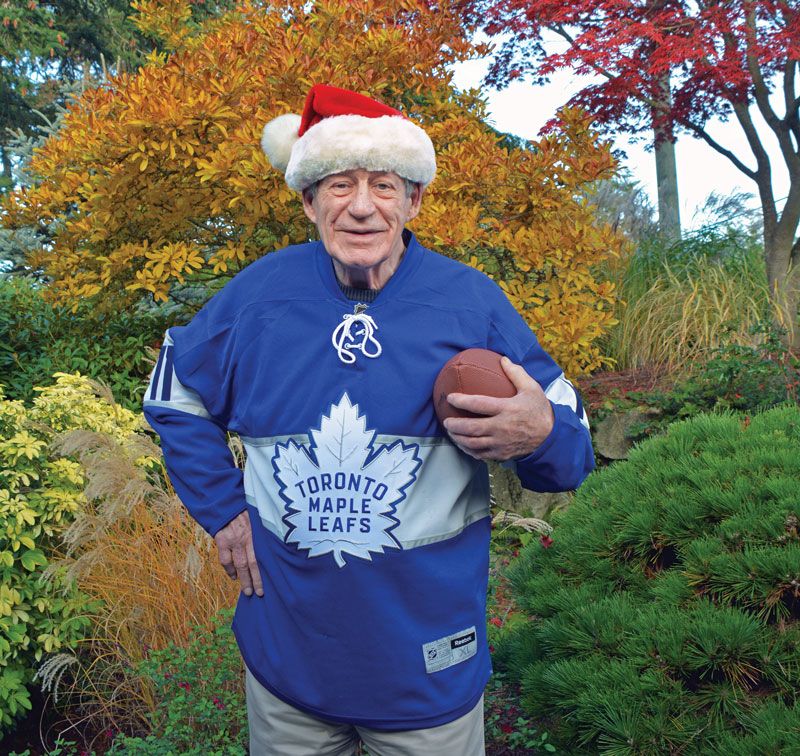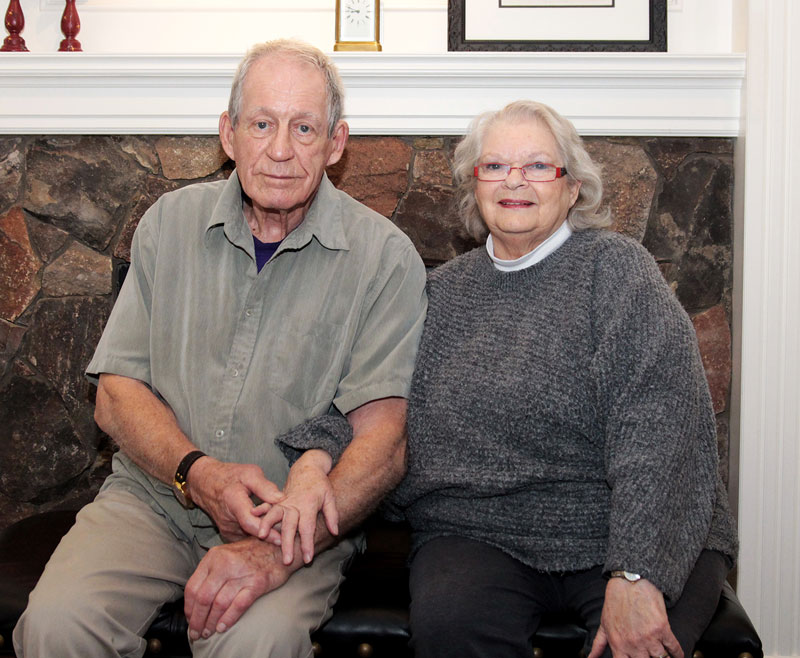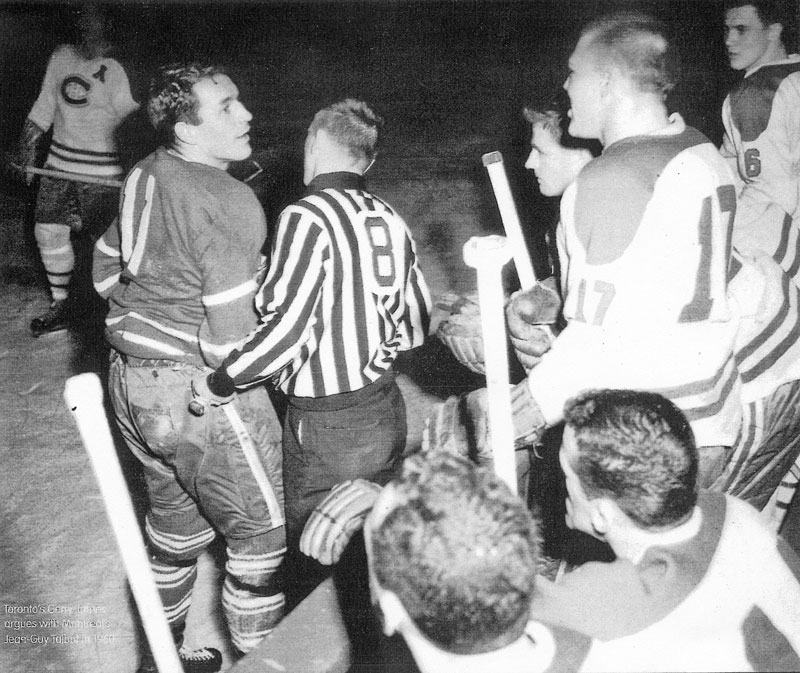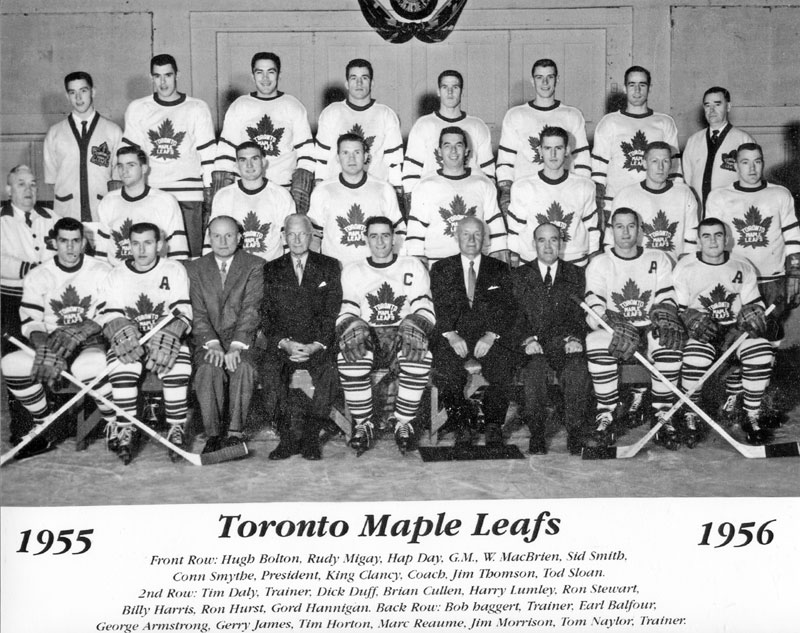GERRY JAMES – CFL & NHL
By Lissa Alexander. Photos by Peter McCully, Lissa Alexander and submitted.

Gerry James is a sports legend. His list of accomplishments is nothing short of astounding, including the only athlete to suit up for both the Grey Cup and Stanley Cup finals in the same season, and the first winner of the CFL’s Schenley Most Outstanding Canadian Award in 1954, which he won again in 1957.
He was the youngest player ever to play in the Canadian Football League (CFL) at 17, and he is a member of numerous Halls of Fame, including the Canadian Football Hall of Fame, and the Saskatchewan Sports Hall of Fame. But Gerry’s not one to boast about his accomplishments, he seems to prefer the animated stories.
As I sit talking with him and his wife Margaret in their Nanoose Bay home, we lightheartedly discuss a spectacular framed photo from a Toronto Maple Leafs’ game, where Gerry’s legs are flying above his body. Was he pushed and then overexaggerated a fall, or did he just, plain fall? His wife and the rest of the world believe the latter, Gerry explains. “So, you’re saying you did that on purpose?” I ask. “I did,” he insists, smirking. “Don’t believe everything he says,” his wife adds with a smile.
What is clear about Gerry’s career from the photos and framed letters that adorn his home, is that he was a very talented, sought-after player. But getting him to admit that is an entirely different ballgame.

Kid Dynamite
Gerry was born in 1934 and grew up in Winnipeg during the Second World War. He says he was lucky to have grandparents who had a farm where they grew their own food, or else they wouldn’t have had any.
He kept busy playing all kinds of sports throughout his childhood. All the kids did, he explains. “That was all you did. I played hockey, I played football, I played baseball, I played basketball, I played volleyball, I just wanted to do things,” he remembers.
“And you were probably quite good at most of them?” I offer. “I was pretty good at some,” he admits.
His dad, Eddie “Dynamite” James, played for the Regina Roughriders and the Winnipeg Blue Bombers, before heading overseas to fight in the war in 1939 when Gerry was six years old.
A few years after Eddie returned from the war in 1945, he and Gerry’s mom divorced. In 1958, at only 50 years old, he died from complications of the liver.
“I was just reading about how everybody in the CFL admired my dad as being a very honest and good all around player,” Gerry says. “Everybody liked him. That’s pretty special.”
Gerry was nicknamed Kid Dynamite after his father, and their names are now side-by-side in the Canadian Football Hall of Fame.

A little toughness
Gerry started playing hockey at age six. He had ice skates but was never able to get them sharpened, as he couldn’t afford it. But that didn’t stop him. “The road was ice all the time, so I just skated down to the rink,” he recalls. “So that was kind of fun.”
Gerry developed strength from riding his bike throughout the year, and playing kick ball with the local kids.
That conditioning helped him thrive in sports as a teenager, playing junior hockey at 16, and joining the Blue Bombers summer camp at age 17. He credits the people who helped him along the way for these achievements, and says he wishes he could have properly thanked them. “I had a lot of people who helped me—who made me,” he says. “They all passed away before I knew they helped me so much.”
That support, and Gerry’s passion for sports, went a long way. He led the Canadian Football League’s Blue Bombers in rushing in 1954, 1955 and 1957 and became the Bombers leading scorer in 1957, 1960, 1961 and 1962.
Altogether Gerry competed for six Grey Cups and won four. He set 18 CFL records and for 43 years he held the CFL record for most rushing touchdowns in a season (18).
He was also offered a contract to play in the National Football League (NFL) with the New York Giants, but he declined as the money wasn’t great, and he had a family in Winnipeg.
Meanwhile, in the hockey world, he helped the Toronto Marlboros win the 1955 Memorial Cup, before playing his first NHL game with the Toronto Maple Leafs that same year.
For four years he played with the Leafs, because in Gerry’s words, “they needed a little toughness.” He got to play in the Stanley Cup finals in 1960, and although he didn’t win, he’ll never forget one special moment in the third period, when Maurice “Rocket” Richard was on the ice.
“I got to the NHL and I was playing against The Rocket in the Stanley Cup final against my idol,” he remembers. “That was memorable.”

Puck to the eye
And of course, life in sports doesn’t come without its challenges. He broke his leg once playing football, and there was the time he got a puck in the eye.
“Hockey and football had hardly any requirements at that time, in regard to whether you could have one eye, or two eyes, or no eyes…” he clarifies.
Gerry permanently damaged his eye, and when he was getting his eyes tested for football years later, they covered his good eye and asked him to read the letters on a chart. “What chart?” he asked.
A book published in 2012 about Gerry’s life, entitled Kid Dynamite, the Gerry James story, written by Ron Smith, reveals that Gerry later became one of the most successful coaches in minor league hockey, voted all-star coach seven times in the Saskatchewan Junior Hockey League.
These days life has slowed down quite a bit for the 86-year-old. He used to enjoy playing golf, but spinal stenosis has curbed that activity. “I just couldn’t do it,” he explains. “But I have two new knees and one hip replacement, and I’m not active, but I’m okay.”
“Not active” is defined a little differently for Gerry than most of us. He has been playing in the local dart league for the past few years (pre-COVID), he’s an avid gardener, and he has continued to volunteer in the Meals on Wheels program for Society of Organized Services (SOS) throughout the pandemic. “I like helping people,” he admits.
When I ask Gerry how his teammates would have described him his answer comes without hesitation. “Tough. I think that would be calling a spade a spade. And honest.”
And besides missing the physicality of sports, he says he misses the camaraderie. It seems that beneath the brawny exterior he has come to be known for, there is a warmhearted and humble man who is grateful for the path he was able to take.
“I was just having fun and I happened to be lucky that people that saw me.”